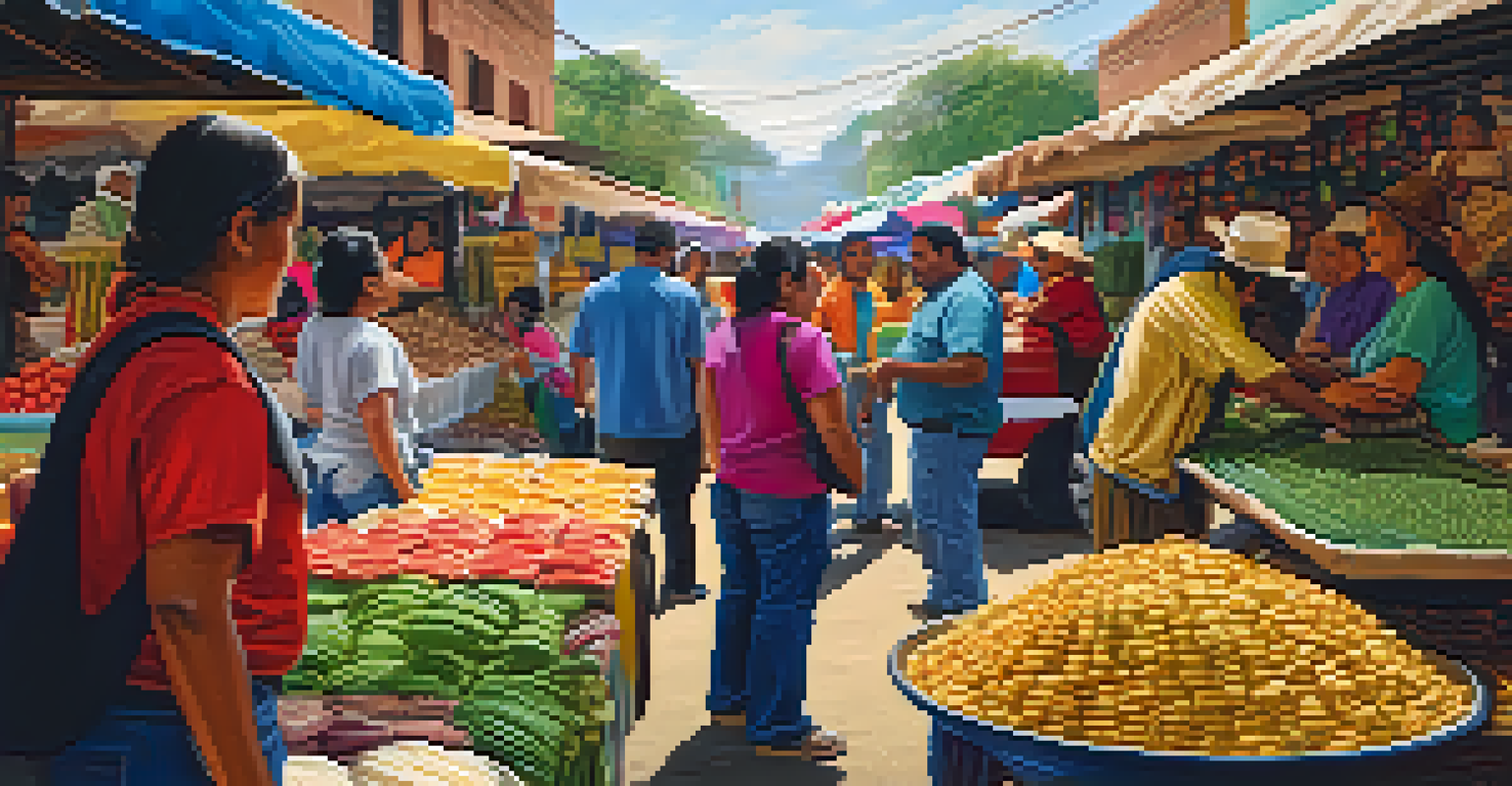The Role of Language in Cultural Immersion During Travel

Understanding Cultural Immersion Through Language
Cultural immersion is all about diving deep into a new environment, and language plays a pivotal role in this experience. When travelers engage with local languages, they not only communicate but also connect on a deeper level. It's like having a key that unlocks the door to a community's traditions, values, and way of life.
A different language is a different vision of life.
Imagine wandering the streets of Paris, ordering a coffee in French, and hearing the barista's warm response. Suddenly, you’re not just a tourist; you’re part of the daily rhythm of that city. This simple act of speaking the language can transform your experience from mere observation to genuine participation.
Moreover, understanding the nuances of a language can reveal cultural subtleties that might otherwise go unnoticed. For instance, certain phrases reflect local humor or customs that can deepen your appreciation for the culture itself.
Breaking Down Barriers with Language Skills
Language is a powerful tool for breaking down barriers, fostering connections between people from different backgrounds. When you speak even a few words of a local language, it shows respect and willingness to engage, often leading to warmer interactions. Locals are usually more inclined to help and share their stories when they see you making an effort.

Consider the example of a traveler in Japan who learns to say 'arigato' (thank you) and 'sumimasen' (excuse me). These simple phrases can lead to genuine smiles and conversations that enrich the travel experience. It’s about creating a bridge that can turn strangers into friends.
Language Deepens Cultural Connections
Engaging with local languages transforms travelers from mere observers to active participants in a culture.
In many cases, speaking the language can also provide insights into cultural practices and social norms that wouldn’t be as apparent otherwise. This understanding can help avoid cultural faux pas, making your travels smoother and more enjoyable.
The Role of Language in Culinary Experiences
Food is often at the heart of cultural experiences, and language enhances this connection immensely. When a traveler can read a menu in the local language, it opens up a world of authentic flavors and dishes that might be overlooked. Knowing the terms for local specialties can lead to delightful culinary discoveries.
To learn a language is to have one more window from which to look at the world.
For instance, imagine strolling through a bustling market in Mexico, confidently asking a vendor about their handmade tamales. Your ability to communicate not only enhances your dining experience but also allows you to learn about the ingredients and traditions behind the food.
Additionally, engaging with local chefs or home cooks in their native language can result in memorable cooking classes or shared meals. These experiences not only satisfy your taste buds but also provide a deeper understanding of the culture through its cuisine.
Navigating Cultural Norms and Etiquette
Every culture has its own set of norms and etiquettes, often conveyed through language. Understanding these subtleties can be crucial for respectful interactions. For example, in many Asian cultures, the way you address someone can convey respect or familiarity, highlighting the importance of language in social settings.
When travelers take the time to learn polite forms of address or common phrases, they demonstrate awareness and appreciation for the local customs. This effort can lead to richer experiences and a better reception from the locals.
Language Breaks Down Barriers
Speaking even a few words of a local language fosters respect and leads to more meaningful interactions.
Additionally, understanding idiomatic expressions or proverbs can provide a window into a culture’s values and beliefs. This knowledge fosters a more profound respect for the people and their way of life.
Language Learning as a Travel Preparation Tool
Preparing for a trip often involves learning a few key phrases or common words in the destination's language. This preparation is not just practical; it enhances your confidence and sets the tone for your journey. Familiarity with the language can ease anxieties and make you feel more at home upon arrival.
Many travelers find that even basic knowledge of the language can open up opportunities for meaningful interactions. For example, a simple greeting can lead to conversations that reveal hidden gems only locals know about, such as off-the-beaten-path attractions or dining spots.
Moreover, the process of learning the language itself can be a fun and enriching activity that heightens your anticipation for the trip. It’s like a warm-up that prepares not just your mind, but also your heart for the adventures ahead.
Language as a Gateway to Authentic Connections
One of the most rewarding aspects of travel is forming authentic connections with people from different cultures. Language serves as the gateway to these connections, allowing for genuine conversations and shared experiences. When you communicate in someone’s native tongue, it creates a bond that transcends mere tourism.
For instance, consider a traveler who strikes up a conversation with a local artist in Italy, discussing their work in Italian. This interaction can lead to an invitation to a workshop or a personal tour of the artist's studio, enriching the travel experience in ways a guidebook never could.
Language Enhances Culinary Experiences
Understanding the local language allows travelers to explore authentic dishes and culinary traditions more fully.
These connections often lead to lasting friendships, bridging cultural divides and fostering mutual understanding. Language can turn an ordinary trip into a journey filled with meaningful relationships and unforgettable memories.
Overcoming Language Barriers in Travel
Despite the importance of language in travel, not everyone is fluent in the local tongue. However, overcoming language barriers is part of the adventure. Utilizing translation apps, gesturing, or even drawing can facilitate communication when words fail. This creativity often leads to humorous and memorable moments.
For example, a traveler in a remote village might find themselves using a combination of body language and a translation app to ask for directions. While it can be challenging, these situations often result in unexpected laughter and camaraderie with locals.

Moreover, the experience of navigating language barriers can enhance your problem-solving skills and adaptability. It teaches you to be resourceful and open-minded, qualities that are invaluable not just in travel, but in life.